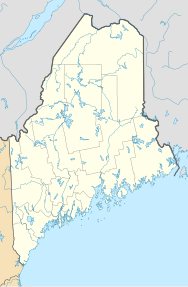Kittery, ME
| Kittery, Maine | ||
|---|---|---|
| Town | ||

Old Block House at Fort McClary (c. 1908)
|
||
|
||
| Motto: Gateway to Maine | ||
| Location within the state of Maine | ||
| Coordinates: 43°5′35″N 70°43′41″W / 43.09306°N 70.72806°W | ||
| Country |
|
|
| State |
|
|
| County | York | |
| Settled | 1632 | |
| Incorporated | 1647 | |
| Government | ||
| • Assessor | Bruce Kerns | |
| Area | ||
| • Total | 75.30 sq mi (195.03 km2) | |
| • Land | 17.78 sq mi (46.05 km2) | |
| • Water | 57.52 sq mi (148.98 km2) | |
| Elevation | 23 ft (7 m) | |
| Population (2010) | ||
| • Total | 10,072 | |
| • Estimate (2012) | 10,072 | |
| • Density | 533.7/sq mi (206.1/km2) | |
| Time zone | Eastern (EST) (UTC-5) | |
| • Summer (DST) | EDT (UTC-4) | |
| ZIP code | 03904 | |
| Area code(s) | 207 | |
| FIPS code | 23-37270 | |
| GNIS feature ID | 0582544 | |
| Website | http://www.kitteryme.gov/ | |
Kittery is a town in York County, Maine, United States. Home to the Portsmouth Naval Shipyard on Seavey's Island, Kittery includes Badger's Island, the seaside district of Kittery Point, and part of the Isles of Shoals. The town is a tourist destination known for its many outlet stores.
Kittery is part of the Portland–South Portland–Biddeford, Maine metropolitan statistical area. The town's population was 9,490 at the 2010 census.
English settlement around the natural harbor of the Piscataqua River estuary began about 1623. By 1632 it was protected by Fort William and Mary on today's New Hampshire side of the river; in 1689 defensive works that later became Fort McClary in Kittery Point were added on today's Maine side to the north.
Kittery was incorporated in 1647, staking a claim as the "oldest incorporated town in Maine." It was named after the birthplace of a founder, Alexander Shapleigh, from his manor of Kittery Court at Kingswear in Devon, England. Shapleigh arrived in 1635 aboard the ship Benediction, which he co-owned with another prominent settler, Captain Francis Champernowne, a cousin of Sir Ferdinando Gorges, lord proprietor of Maine. Together with the Pepperrell family, they established fisheries offshore at the Isles of Shoals, where fish were caught, salted, and exported back to Europe. Other pioneers were hunters, trappers, and workers of the region's abundant timber. The settlement at the mouth of the Piscataqua River was protected by Fort McClary.
...
Wikipedia


